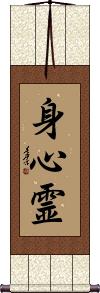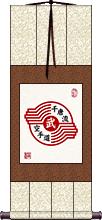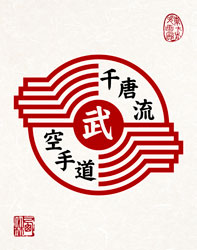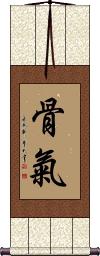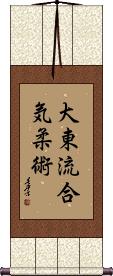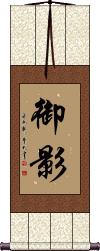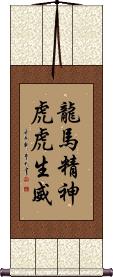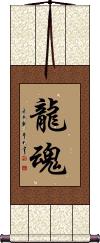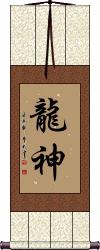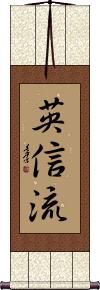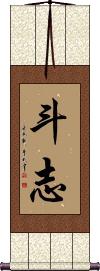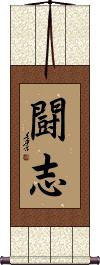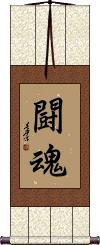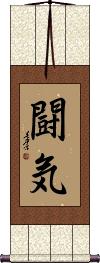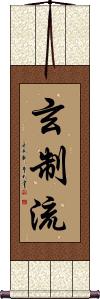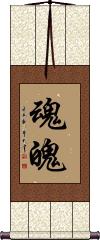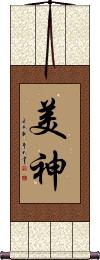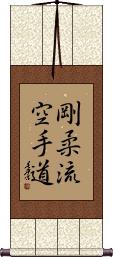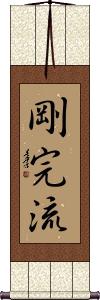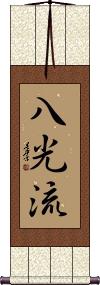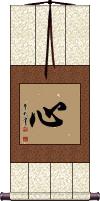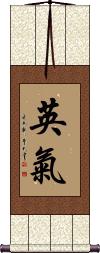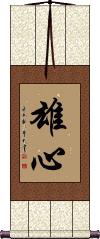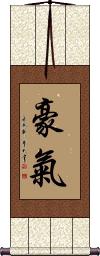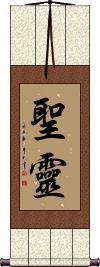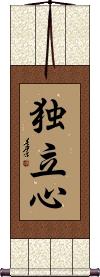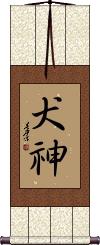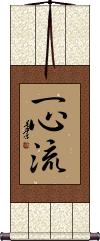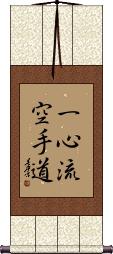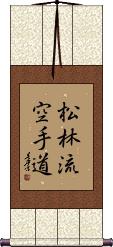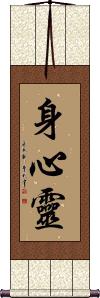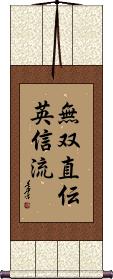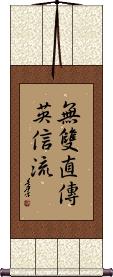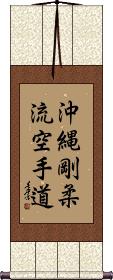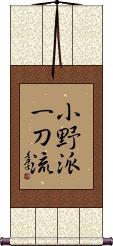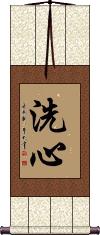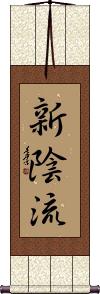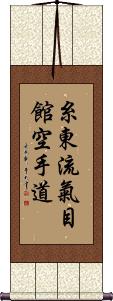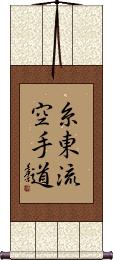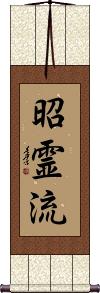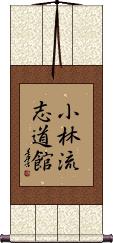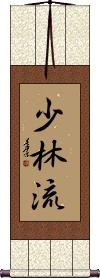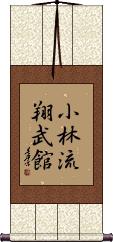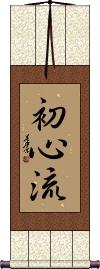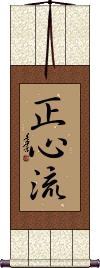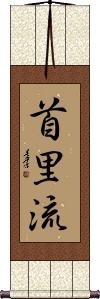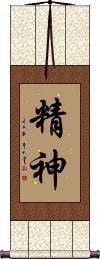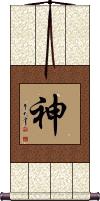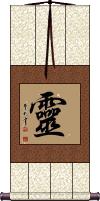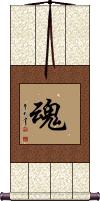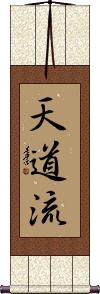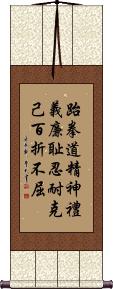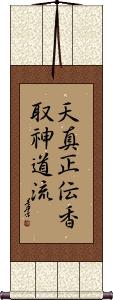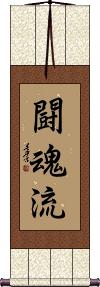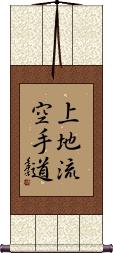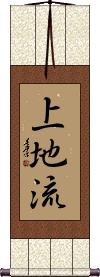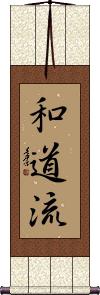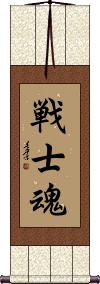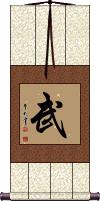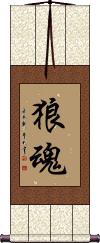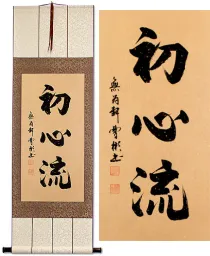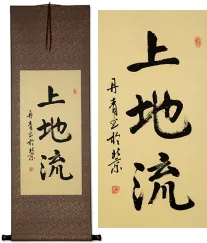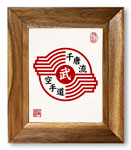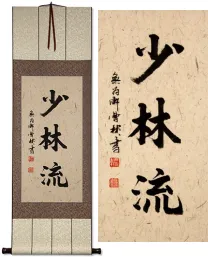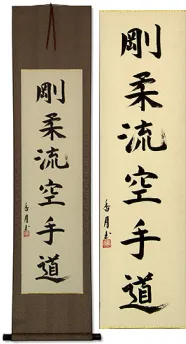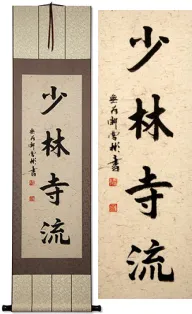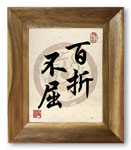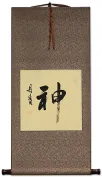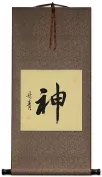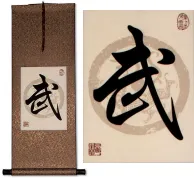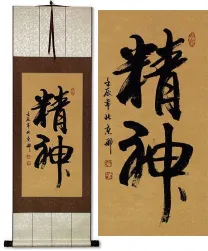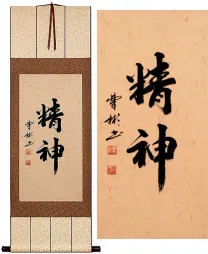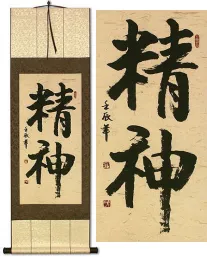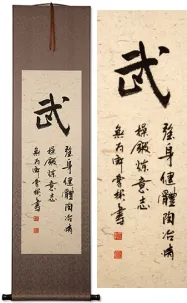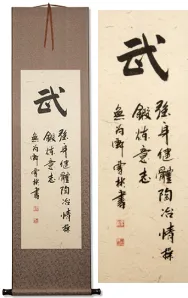Many custom options...
And formats...

Not what you want?
Try other similar-meaning words, fewer words, or just one word.
Shoshin Ryu Beginners Spirit in Chinese / Japanese...
Buy a Shoshin Ryu Beginners Spirit calligraphy wall scroll here!
Personalize your custom “Shoshin Ryu Beginners Spirit” project by clicking the button next to your favorite “Shoshin Ryu Beginners Spirit” title below...
Switched to secondary search mode due to lack of results using primary.
These secondary results may not be very accurate. Try a different but similar meaning word or phrase for better results. Or...
Look up Shoshin Ryu Beginners Spirit in my Japanese Kanji & Chinese Character Dictionary(My dictionary is a different system then the calligraphy search you just tried)
If you want a special phrase, word, title, name, or proverb, feel free to contact me, and I will translate your custom calligraphy idea for you.
1. Advance Bravely / Indomitable Spirit
2. Aijou-Ryu
4. Beautiful Heart / Beautiful Spirit
8. Chito-Ryu
11. Daito-Ryu
13. Divine Spirit
14. The Spirit of the Dragon Horse
15. The Spirit of the Dragon Horse and Power of a Tiger
16. Dragon Spirit
17. The Spirit of Dragon and Tiger
18. Eishin-Ryu
19. Esprit de Corps / Team Spirit
20. Fighting Spirit
21. Free Spirit
25. Goddess of Beauty / Beautiful Spirit
26. Goju Ryu
28. Go Kan Ryu
29. Hakko-Ryu
31. Heroic Spirit
32. Heroic Spirit / Great Ambition
35. Independent Spirit / Independent Heart
37. Indomitable Spirit / Indomitable Attitude
39. Inner Beauty / Beauty of Spirit
43. Iwama Ryu
44. Kanzen Goju-Ryu
46. Matsubayashi-Ryu Karate-Do
49. Mind Body Spirit
51. Muso Shinden-Ryu
53. Okinawa Goju Ryu Karate-Do
54. Old, But More Vigorous in Spirit
55. Ono-Ha Itto-Ryu
56. Purified Spirit / Enlightened Attitude
57. Shinden Fudo Ryu
58. Shinkage-Ryu
59. Shin Kakuto-Ryu
60. Shinto Muso-Ryu
61. Shito-Ryu Ki-Me-Kan Karate-Do
62. Shito-Ryu
64. Shorei-Ryu
66. Shorin Ji Ryu
67. Shorin-Ryu
69. Shoshin-Ryu
70. Shotokan-Ryu
71. Shuri-Ryu
72. Spirit
73. Spirit / Spiritual Essence
74. Spirit / Soul
76. Spirit Of The Dragon Martial Arts
77. Spiritual Strength / Strength of Spirit
78. Soul / Spirit
79. Tendo-Ryu
80. Taekwondo Tenets / Spirit of Taekwon-do
82. Tenshin Shoden Katori Shinto-ryu
83. Toukon-Ryu
85. Uechi-Ryu
86. Wado-Ryu
87. Wado-Ryu Karate
88. Warrior Soul / Heroic Spirit
89. Warrior Soul / Spirit of a Fighter
Advance Bravely / Indomitable Spirit
This proverb creates an image of a warrior bravely advancing against an enemy regardless of the odds.
This proverb can also be translated as “indomitable spirit” or “march fearlessly onward.”
See Also: Indomitable | Fortitude
Aijou-Ryu
Asayama Ichiden-Ryu
Beautiful Heart / Beautiful Spirit
Beautiful Spirit
Body Mind Spirit
身心霊 means “body mind spirit” in Japanese.
This refers to your physical, mental, and spiritual presence.
This can also be translated as “body heart spirit” as 心 can mean mind or heart.
Note that this is a "word list" and not a proper phrase (with a subject, verb, and object) nor a typical title in Japanese. So it's not too commonly seen in Japan. However, the term 身心霊整合性医療 that refers to holistic medicine is gaining popularity.
Bushi-Ryu Jujutsu
Chito-Ryu
千唐流 (Chitō-Ryū, Chito-Ryu, or Chitoryu) is a style of karate founded by Tsuyoshi Chitose.
Here's the meaning of each character of the title:
千 = 1000
唐 = China (literally Tang, as in Tang Dynasty).
流 = Style or School.
Together, Chito-Ryu means “1,000 [year old] Chinese style.”
I will leave it up to you whether this is of Japanese or Okinawan style. The title certainly suggests roots traced back to China.
Chowa-Ryu Jujitsu
Courageous Spirit
Daito-Ryu
Daito-Ryu Aiki-jujutsu
School of Japanese Martial Arts
大東流合気柔術 is Daitō-Ryū Aiki-jūjutsu, a Japanese martial art established by Takeda Sōkaku.
The most famous student of Daitō-Ryū Aiki-jūjutsu is Morihei Ueshiba who later founded the school or branch of martial arts known as Aikido.
Note: 大東流合気柔術 can also be romanized as Daito-ryu Aiki-Jujutsu, Daitou-Ryuu Aiki-Juujutsu or Daito-Ryu Aiki-Jujitsu.
Divine Spirit
御影 is a Japanese word that means divine spirit or honorific language for “spirit of the dead.”
This can also refer to an image of a deity, buddha, royal, noble, etc.)
In the Buddhist context, it can mean (wooden) images of saints or deities.
御影 is also a Japanese name, Mikage.
Note: This is also a word in Chinese but not used very often in China (except perhaps by certain Buddhists).
The Spirit of the Dragon Horse
龍馬精神 is an old proverb that is used to wish someone good health and success combined as a great compliment.
The meaning is “The vigor and spirit of the legendary dragon-horse.” These four characters are often accompanied by four more which mean “...and the power and prestige of the tiger.” Here we are just offering the first part which is considered the short version.
By giving a wall scroll like this to someone, you were either wishing or telling them that they have an amazing quality. There is also a suggestion of good health - at least anyone with the vigor of a dragon horse would seem to also be in good health.
Note: In Japanese, this would be read as the spirit of 坂本龍馬 (Sakamoto_Ryōma), a beloved rebel who help abolish the old Japanese feudal system. This can be confusing, so I am declaring this proverb to be Chinese only.
The Spirit of the Dragon Horse and Power of a Tiger
龍馬精神虎虎生威 is an old proverb that is used to wish someone great health and success combined as a great compliment.
The meaning is “The vigor and spirit of the legendary dragon-horse and the power and prestige of the tiger.”
By giving a wall scroll like this to someone, you were either wishing or telling them that they have these qualities. There is also a suggestion of good health - at least anyone with the vigor of a dragon horse would seem to also be in good health.
Dragon Spirit
Dragon Spirit
龍神 is a Chinese, Japanese Kanji, and old Korean Hanja title that can mean “dragon god,” “dragon king,” or “dragon spirit.”
In the context of Buddhism, this is one of eight kinds of spiritual beings found in Mahāyāna texts.
The Spirit of Dragon and Tiger
龍虎精神 means the spirit of the dragon and tiger.
It speaks to the vitality and vigor that is the nature of these two creatures.
Beyond “spirit,” the last two characters can also mean mind, soul, or heart. Therefore, you can also say this means “Heart of the Dragon and Tiger,” etc.
龍虎精神 is often titled “Ryukoseishin” in many Japanese martial arts.
Eishin-Ryu
Esprit de Corps / Team Spirit
Fighting Spirit
The Will to Fight
斗志 literally means fighting spirit in Chinese.
As in the spirit that a warrior, soldier, athlete, or fighter must possess.
 Note: There is more than one way to write the first character of this word. It is sometimes written like the version shown to the right (yes, it's completely different but has the same meaning & pronunciation). If you have a preference, please let us know in the special instructions about your order.
Note: There is more than one way to write the first character of this word. It is sometimes written like the version shown to the right (yes, it's completely different but has the same meaning & pronunciation). If you have a preference, please let us know in the special instructions about your order.
Fighting Spirit
Fighting Spirit
Alternate Japanese version
Fighting Spirit
Free Spirit
The first two characters mean freedom or liberty.
The second two characters mean spirit, heart, mind, or soul.
Together, 自由精神 is a title that is very similar to the English term “free spirit.”
See Also: Freedom | Independence
Free Spirit
自由な精神 is very similar to the English term “free spirit.”
The first two characters mean freedom or liberty.
The middle character is a connecting Hiragana which is needed for Japanese grammar.
The last two characters mean spirit, heart, mind, or soul.
See Also: Freedom | Independence
Fruit of the Spirit
Genseiryu / Gensei-Ryu
Ghost / Soul / Spirit
魂魄 is a Chinese, Japanese Kanji, and old Korean Hanja term for ghost, soul, or spirit.
It's used in the context of Buddhism as:
Animus and anima; the spiritual nature or mind, and the animal soul; the two are defined as mind and body or mental and physical, the invisible soul inhabiting the visible body, the former being celestial, the latter terrestrial.
Goddess of Beauty / Beautiful Spirit
In Chinese, 美神 means Goddess of Beauty.
The first character means beauty or beautiful.
The second character means spirit (can also mean god, goddess, or soul).
Some will use this as a short way to say, “Beautiful Spirit.”
This has a similar meaning in Japanese but is used more often as a female given name in Japan. As a Japanese given name, it can be pronounced Mikami, Mikan, or Binasu.
Goju Ryu
Goju Ryu Karate-Do
Go Kan Ryu
Hakko-Ryu
八光流 (Hakkō-Ryū) is a style of jujutsu associated with Daito-Ryu.
The title Hakko-Ryu comes from the Japanese phrase which translates as “The Style of the Eighth Light,” or more literally, “Eighth Light Style.”
The 光 character is associated with brightness or brilliance. It can be used to describe someone of great talent or potential. So the meaning goes far beyond just light.
Heart / Mind / Spirit
心 would often be translated as “heart.”
However, because it was believed in Chinese culture for thousands of years that your consciousness and thoughts came from the big red organ in the middle of your chest, it also means “mind” or “spirit” and sometimes even “soul.”
In Korean, beyond heart, mind, and spirit, this character can mean moral, nature, mind, affections, intentions, core, and center. In fact, it is used in Chinese to mean “center” as well but only with another character in front of it. For instance, “medical center” or even “shopping center.” Separately and alone, it will not be read with that “center” meaning unless thought of as “the center of your soul.”
Heroic Spirit
Heroic Spirit / Great Ambition
Heroic Spirit / Heroism
豪氣 is heroic spirit or heroism in Chinese and old Korean Hanja.
This might come across as a bit arrogant to hang on your wall.
Holy Spirit / Holy Ghost
聖靈 is the title for the Holy Spirit or Holy Ghost as used by Jewish, Catholic, and Protestant (and other Christian) Chinese people.
And yes, Chinese Jews do exist, but there are not many of them.
The first character means Holy, Sacred, Saint, or Sage. The second means ghost, spirit, efficacious, or intelligence.
This is valid in Chinese characters and old Korean Hanja. This will be recognized in Japan but see the note below...
![]() In modern Japan, they now use a variant/simplified Kanji of the second character of Holy Spirit. If you want this Japanese version, click on the Kanji to the right instead of the button above.
In modern Japan, they now use a variant/simplified Kanji of the second character of Holy Spirit. If you want this Japanese version, click on the Kanji to the right instead of the button above.
Independent Spirit / Independent Heart
獨立心 means independent spirit or independent heart in Japanese.
The first two characters mean independent or independence. The third character means spirit, heart, or mind.
獨立心 is a Japanese term, although Chinese people could guess the meaning (the characters make sense individually in Chinese but are not often used this way). Also, the first character would be written 獨 in Traditional Chinese versus 独 which is the Simplified Chinese and modern Japanese version.
Independent Spirit
獨立精神 means independent spirit in Chinese.
The first two characters mean independent, independence, or to stand alone.
The last two characters mean spirit, spiritual, vigor, vitality, drive, mind, consciousness, thought, essence, heart, or soul.
With this information, you can make your translation combination such as “independent heart,” “stand-alone spirit,” or more creatively, “the drive to stand alone” in English. There are a lot of ways to interpret 獨立精神.
Indomitable Spirit / Indomitable Attitude
Fukutsu no Seishin
Indomitable Spirit
Indomitable Spirit
Korean Only
百折不屈 is a Korean proverb that means “indomitable spirit,” at least, that is the way it is commonly translated in martial arts circles (Taekwondo, Hapkido, etc.).
The literal translation is “[one] hundred [times] broken [still] don't succumb.”
Or more naturally translated, “Even if attacked/beaten one hundred times, still be undaunted/indomitable.”
Notes:
Some will say this is one long word rather than a proverb.
This is also a proverb/word in Chinese though rarely used in modern times.
Inner Beauty / Beauty of Spirit
Inner Beauty / Beauty of Spirit
Inugami / Dog Spirit
Isshin-Ryu / Isshinryu
一心流 is the title for Isshin-Ryu Karate.
The literal meaning is “one heart method.” You could also translate it as “unified hearts methods.” It implies people doing things as if with one heart and mind.
The second Kanji can be defined as the heart, mind, or essence of your being. Clearly, there's a multitude of ways you can define this title in English.
See Also: Isshin-Kai
Isshin Ryu Karate Do
一心流空手道 is the full title for Isshin-Ryu Karate-Do.
The literal meaning is “one heart method empty hand way.”
There are other ways to translate this, but if you are looking for this title, you already know that.
This would make a great wall scroll for your dojo or private studio if you study this form of Japanese (technically from Okinawa) Karate.
Because this is a specifically-Japanese title, I strongly recommend that you select our Japanese Master Calligrapher to create this artwork.
Iwama Ryu
Kanzen Goju-Ryu
Katori Shinto-ryu
Matsubayashi-Ryu Karate-Do
鬆林流空手道 is the Japanese title for the Matsubayashi-Ryu Karate-Do school of martial arts.
If directly translated, it means “Pine Forest Style Empty Hand Way.”
Notes:
1. 松林流 can be pronounced Matsubayashi-Ryū or Shōrin-Ryū. This can be confusing as Shōrin can also represent 少林 which refers to the Shaolin (little forest) style.
2. 松 can also be written in the traditional form of 鬆.
Matsumura Shorin-Ryu
Matsumura Sōkon's Shaolin Style
Meifu Shinkage-Ryu
Mind Body Spirit
身心靈 is probably the best way to express the idea of “Body, Mind, and Spirit” in Chinese and old Korean Hanja. We are actually using the word “heart” here because, for thousands of years, the heart was thought to be the place where your thoughts, feelings, and emotions came from. We do something similar in the west when we say “warm-hearted” or “I love you with all of my heart.” In this context, heart = mind in Asian language and culture.
The very literal translation of these three characters is “body, heart & spirit,” which could also be interpreted as “body, mind & soul.”
We have arranged these characters in this order because it simply “feels” like the proper order in the Chinese language. Word lists like this are not so common for calligraphy artwork, so we must be careful to put them in the most natural order. It should be noted that this is not a common title in Asia, nor is it considered an actual phrase (as it lacks a clear subject, verb, and object).
![]() In Japanese Kanji, they use an alternate form of the character for soul or spirit. If you want this using the Japanese alternate, please click on the Kanji shown to the right instead of the button above.
In Japanese Kanji, they use an alternate form of the character for soul or spirit. If you want this using the Japanese alternate, please click on the Kanji shown to the right instead of the button above.
Japanese disclaimer: This is not a natural phrase/list in Japanese. While not totally-natural in Chinese, this word list is best if your audience is Chinese.
Muso Jikiden Eishin-Ryu
無双直伝英信流 is the modern way to write the Japanese martial arts term, Musō Jikiden Eishin-Ryū (iaido style).
Sometimes the second Kanji is written as 雙, and the fourth Kanji is written 傳, making the full title 無雙直傳英信流. See the other version of this title if you want that traditional version.
Muso Jikiden Eishin-Ryu
Muso Shinden-Ryu
Nippon Shorin-Ryu
Okinawa Goju Ryu Karate-Do
Old, But More Vigorous in Spirit
Age is just a number
老當益壯 is a Chinese proverb that means “old but vigorous” or “hale and hearty despite the years.”
Said of someone who is more spirited when he/she grows older.
The story behind this Chinese proverb:
In the Eastern Han Dynasty, there was a man named Ma Yuan. He had been planning to herd animals on the frontier since he was young. When he grew up, Ma became a minor official of a county.
Once, he was sending some prisoners to another location. He felt pity for them, so he set them free, and then he fled to another county in the north. He herded animals there, and thus his dream came true. He always said: “If you want to be a great man, the poorer you are, the firmer in spirit you have to be; the older you are, the more spirited you should be.”
Later, when he was even older, Ma Yuan became a famous general of the Eastern Han Dynasty and contributed to many battles.
Ono-Ha Itto-Ryu
Purified Spirit / Enlightened Attitude
A Japanese martial arts title/concept
The first Kanji alone means to wash, bathe, primness, cleanse or purify.
The second Kanji means heart, mind, soul, or essence.
Together, these two Kanji create a word defined as “purified spirit” or “enlightened attitude” within Japanese martial arts.
洗心 is one of the five spirits of the warrior (budo) and is often used as a Japanese martial arts tenet. Under that context, it's often defined as a spirit that protects and harmonizes the universe. Senshin is a spirit of compassion that embraces and serves all humanity and whose function is to reconcile discord in the world. It holds all life to be sacred. It is the Buddha mind.
This title will only be familiar to Japanese who practice certain martial arts. Others may not recognize this word at all.
洗心 does not show up as a word in too many Chinese dictionaries, but it can be read and has the same meaning in Chinese.
![]() There is an issue with the first character. The original, and probably most correct version is shown above. However, many dojo documents and other sources have used a more simple first character. Arguments ensue about which version is correct. If you want to be correct in the Japanese language, use the "Select and Customize" button above. If you want to match the Kanji used by your dojo, click the Kanji shown to the right. There is a slightly different meaning with this first character which means before, ahead, previous, future, precedence.
There is an issue with the first character. The original, and probably most correct version is shown above. However, many dojo documents and other sources have used a more simple first character. Arguments ensue about which version is correct. If you want to be correct in the Japanese language, use the "Select and Customize" button above. If you want to match the Kanji used by your dojo, click the Kanji shown to the right. There is a slightly different meaning with this first character which means before, ahead, previous, future, precedence.
Shinden Fudo Ryu
Shinkage-Ryu
Style of Japanese sword fighting
Shin Kakuto-Ryu
Shinto Muso-Ryu
Shito-Ryu Ki-Me-Kan Karate-Do
Shito-Ryu
Shito-Ryu Karate-Do
Shorei-Ryu
Shorin-Ryu Shidokan
Shorin Ji Ryu
Shaolin Temple Style
Shorin-Ryu
Shaolin Style
少林流 is the Japanese martial arts title “Shorin-ryu.”
Though the first part of the title comes from the Shaolin (small forest) monks of China.
In Japan, this refers to the Okinawa School of Karate.
![]() Note that often in Japanese, the first Kanji of this title was changed to the version shown to the right. If you prefer this version, please click on the Kanji to the right instead of the button above.
Note that often in Japanese, the first Kanji of this title was changed to the version shown to the right. If you prefer this version, please click on the Kanji to the right instead of the button above.
Shorin-Ryu Shobukan
Shoshin-Ryu
初心流 is often translated in Japanese as “beginner's mind style” or “beginner's spirit method.”
The first character means first, initial, primary, junior, beginning, or basic.
The second character means heart, mind, soul, or essence.
The third character means style, method, or some will translate it as a school.
Please note, there is more than one martial arts school that romanizes as Shoshin-Ryu.
Shoshin-Ryu
正心流 is a Japanese title that means “right heart style” or “true mind method.”
The first character means right, correct, greater, or true.
The second character means heart, mind, soul, or essence.
The third character means style, method, or some will translate it as a school.
Please note, there is more than one martial arts school that romanizes as Shoshin-Ryu.
Shotokan-Ryu
Martial arts term
Shuri-Ryu
Spirit
精神 is the kind of spirit you have if you perform well in sports or competitions. It is the idea of having a good attitude and putting your all into something - so much so that others can see or feel your spirit. It is the essence of your being that can only be subjectively described because there are no words that can fully explain what “spirit” really is.
For your information:
My Japanese dictionary further tries to explain this word by comparing it to mind, soul, heart, or intention.
My Chinese dictionary compares these characters to meanings like vigor, vitality, drive, and mentality.
My Korean dictionary defines this as mind, spirit, and soul.
Spirit / Spiritual Essence
神 is the simplest way to write spirit in Chinese, Japanese Kanji, and old Korean.
This single character alone will conjure up ideas of the spiritual world. 神 can also be translated as “vital awareness” as in the fact that one must know they exist to exist (I think, therefore, I am).
Other translations include:
God, deity, mysterious, divine essence, lively, spiritual being, divinity, supernatural, soul, mind, nerves, and energy. In some extended context, it can mean genius or unusual.
Japanese romanizations vary a lot when this character is combined into other words. However, shin is the original pronunciation taken from Chinese into Japanese. You'll also see it romanized as kami, gami, jin, and a few others, depending on context.
Spirit / Soul
靈 is spirit or soul in Chinese, Japanese Kanji, and old Korean Hanja.
If you look in the dictionary, you'll also find definitions for this character like:
quick; alert; efficacious; effective; departed soul; coffin; spiritual; energy; effective; clever.
![]() There is a modern Japanese version of this character. The button above will get you the traditional/ancient form. But, if you want the modern Japanese, click on the Kanji to the right instead.
There is a modern Japanese version of this character. The button above will get you the traditional/ancient form. But, if you want the modern Japanese, click on the Kanji to the right instead.
Spirit of Taekwondo
跆拳道精神 means “Taekwondo Spirit” or “The Spirit of Taekwondo.”
跆拳道精神 is the title of General Choi's calligraphy often referred to as “The Tenets of Taekwon-do.”
Spirit Of The Dragon Martial Arts
Spiritual Strength / Strength of Spirit
精神力量 is a title that speaks of one's soul or spirit and the capacity or strength that soul possesses.
The first two characters mean mind, heart, spirit, and/or soul.
The last two characters mean strength, capacity, or ability.
Note: Separately, these are two words in Japanese and can be pronounced, but this does not make a natural title in Japanese (best if your audience is Chinese).
Soul / Spirit
魂 means soul or spirit as in the immortal soul that can be detached from the body.
This can also refer to one's Yang energy or spirit.
In the Buddhist context, this can be the soul, conscious mind, or vijñāna.
Tendo-Ryu
Taekwondo Tenets / Spirit of Taekwon-do
跆拳道精神禮義廉耻忍耐克己百折不屈 is General Choi's writing that is often called “The Tenets of Taekwon-do.”
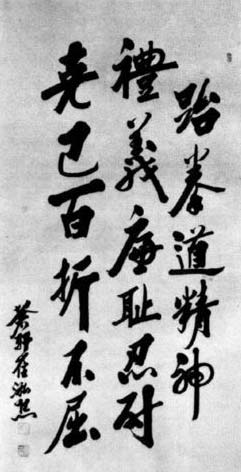
The actual title would be translated as “Taekwondo Spirit” or “The Spirit of Taekwondo.” It was originally written in Korean Hanja (Chinese characters used in Korea for about 1600 years).
General Choi's original calligraphy is shown to the right. Your custom calligraphy will be unique, and not an exact match, as each calligrapher has their own style.In modern times, the common form of written Korean is Hangul (a phonetic character set). The table below shows the text in Hangul and Hanja along with a pronunciation guide and a brief English translation:
| Traditional Korean Hanja | Modern Korean Hangul | Pronunciation | English |
| 跆拳道精神 | 태권도정신 | tae gweon do jeong sin | Taekwondo Spirit |
| 禮儀 | 예의 | ye yi | Courtesy / Etiquette / Propriety / Decorum / Formality |
| 廉耻 | 염치 | yeom ci | Integrity / Sense of Honor |
| 忍耐 | 인내 | in nae | Patience / Perseverance / Endurance |
| 克己 | 극기 | geug gi | Self-Control / Self-Denial / Self-Abnegation |
| 百折不屈 | 백절불굴 | baeg jeor bur gur | Indomitable Spirit (Undaunted even after repeated attacks from the opponent) |
| Note that the pronunciation is the official version now used in South Korea. However, it is different than what you may be used to. For instance, “Taekwon-do” is “tae gweon do.” This new romanization is supposed to be closer to actual Korean pronunciation. | |||
Tenshin-Ryu Heiho
Tenshin Shoden Katori Shinto-ryu
Toukon-Ryu
Uechi-Ryu Karate-Do
Uechi-Ryu
上地流 or Uechi-Ryū is the short name for a traditional style of Okinawan karate.
Uechi-Ryū is named after its creator, Kanbun Uechi. Uechi was an Okinawan man who left at the age of 19 for China to study Chinese martial arts and medicine.
The meaning of this title is “Uechi Flow,” “Uechi Style,” or “Uechi School.” Although, the name 上地 or Uechi can mean “higher stages of practice” in the Buddhist context. Therefore, you can stretch the meaning to be “Higher-Stages-of-Practice Style.”
Wado-Ryu
Style of Karate or Jujitsu
和道流 or Wado-Ryu is a style of Karate or Jujutsu (Jujitsu).
Note: Many will argue whether this is a style of Karate or Jujutsu.
While some find Wado-Ryu similar to Shotokan Karate, enough differences exist in perspective and technique that it stands by itself.
Breaking down the characters into the proper Japanese Romaji, you have “wa dou ryuu” or “wa dō ryū.” The meaning is roughly-translated as “Harmony Way Style” or “Peace Method Style.” The first Kanji should probably be read as harmony rather than peace in this case.
See Also: Wado-Kai
Wado-Ryu Karate
Warrior Soul / Heroic Spirit
勇士精神 can be translated as the warrior's spirit or warrior's soul. The first two characters can be translated as “warrior” or literally “brave soldier/man,” although some will translate this word as “hero.” Therefore, this is also how to say “heroic spirit.”
The second two characters mean vigor, vitality, drive, spirit, mind, heart, mental essence, and psychological component. Basically “your soul.”
We have two versions of this phrase. The only difference is the first two and last two characters are swapped. The version here suggests that you admire or like the idea of the spirit of a warrior. The other version suggests that you are the warrior or hero.
Warrior Soul / Spirit of a Fighter
Warrior Essence / Warrior Spirit / Martial
武 is the essence or spirit of a warrior. 武 is part of the word “wu shu” which is sometimes translated as “martial arts” or “kung fu.”
In more modern speech and another context, this can mean military, martial, warlike, fierce, and perhaps violent but usually as a prefix for a longer word or phrase.
Wolf Spirit / Soul of a Wolf
This in-stock artwork might be what you are looking for, and ships right away...
Gallery Price: $178.00
Your Price: $98.88
Gallery Price: $180.00
Your Price: $99.88
Gallery Price: $180.00
Your Price: $99.88
Gallery Price: $168.00
Your Price: $92.88
Gallery Price: $150.00
Your Price: $82.88
Gallery Price: $168.00
Your Price: $92.88
Gallery Price: $158.00
Your Price: $87.77
Gallery Price: $158.00
Your Price: $87.77
The following table may be helpful for those studying Chinese or Japanese...
| Title | Characters | Romaji (Romanized Japanese) | Various forms of Romanized Chinese | |
| Advance Bravely Indomitable Spirit | 勇往直前 | yǒng wǎng zhí qián yong3 wang3 zhi2 qian2 yong wang zhi qian yongwangzhiqian | yung wang chih ch`ien yungwangchihchien yung wang chih chien |
|
| Aijou-Ryu | 愛情流 爱情流 | ai jou ryuu aijouryuu ai jo ryu | ||
| Asayama Ichiden-Ryu | 淺山一伝流 浅山一伝流 | asa yama ichi den ryuu asayamaichidenryuu asa yama ichi den ryu | ||
| Beautiful Heart Beautiful Spirit | 美麗的心靈 美丽的心灵 | měi lì de xīn líng mei3 li4 de xin1 ling2 mei li de xin ling meilidexinling | mei li te hsin ling meilitehsinling |
|
| Beautiful Spirit | 美しい精神 | utsukushi seishin utsukushiseishin | ||
| Body Mind Spirit | 身心霊 | mi shin rei mishinrei | ||
| Bushi-Ryu Jujutsu | 武士流柔術 | bu shi ryuu ju jutsu bushiryuujujutsu bu shi ryu ju jutsu | ||
| Chito-Ryu | 千唐流 | chi tou ryuu chitouryuu chi to ryu | ||
| Chowa-Ryu Jujitsu | 調和流柔術 调和流柔术 | chou wa ryuu ju jutsu chouwaryuujujutsu cho wa ryu ju jutsu | ||
| Courageous Spirit | 骨氣 骨气 | gǔ qì / gu3 qi4 / gu qi / guqi | ku ch`i / kuchi / ku chi | |
| Daito-Ryu | 大東流 | dai tou ryuu daitouryuu dai to ryu | ||
| Daito-Ryu Aiki-jujutsu | 大東流合氣柔術 大東流合気柔術 | dai tou ryuu ai ki ju jutsu daitouryuuaikijujutsu dai to ryu ai ki ju jutsu | ||
| Divine Spirit | 御影 | goei | yù yǐng / yu4 ying3 / yu ying / yuying | yü ying / yüying |
| The Spirit of the Dragon Horse | 龍馬精神 龙马精神 | lóng mǎ jīng shén long2 ma3 jing1 shen2 long ma jing shen longmajingshen | lung ma ching shen lungmachingshen |
|
| The Spirit of the Dragon Horse and Power of a Tiger | 龍馬精神虎虎生威 龙马精神虎虎生威 | lóng mǎ jīng shén hǔ hǔ shēng wēi long2 ma3 jing1 shen2 hu3 hu3 sheng1 wei1 long ma jing shen hu hu sheng wei | lung ma ching shen hu hu sheng wei | |
| Dragon Spirit | 龍魂 龙魂 | lóng hún / long2 hun2 / long hun / longhun | lung hun / lunghun | |
| Dragon Spirit | 龍神 龙神 | ryuu jin / ryuujin / ryu jin | lóng shén long2 shen2 long shen longshen | lung shen lungshen |
| The Spirit of Dragon and Tiger | 龍虎精神 龙虎精神 | ryu ko sei shin ryukoseishin | lóng hǔ jīng shén long2 hu3 jing1 shen2 long hu jing shen longhujingshen | lung hu ching shen lunghuchingshen |
| Eishin-Ryu | 英信流 | ei shin ryuu eishinryuu ei shin ryu | ||
| Esprit de Corps Team Spirit | 團隊精神 团队精神 | tuán duì jīng shén tuan2 dui4 jing1 shen2 tuan dui jing shen tuanduijingshen | t`uan tui ching shen tuantuichingshen tuan tui ching shen |
|
| Fighting Spirit | 斗志 | dòu zhì / dou4 zhi4 / dou zhi / douzhi | tou chih / touchih | |
| Fighting Spirit | 闘誌 闘志 | tou shi / toushi / to shi | ||
| Fighting Spirit | 闘魂 | tou kon / toukon / to kon | ||
| Fighting Spirit | 闘氣 闘気气 | tou ki / touki / to ki | ||
| Free Spirit | 自由精神 | zì yóu jīng shén zi4 you2 jing1 shen2 zi you jing shen ziyoujingshen | tzu yu ching shen tzuyuchingshen |
|
| Free Spirit | 自由な精神 | ji yuu na sei shin jiyuunaseishin ji yu na sei shin | ||
| Fruit of the Spirit | 精神的果實 精神的果实 | jīng shén de guǒ shí jing1 shen2 de guo3 shi2 jing shen de guo shi jingshendeguoshi | ching shen te kuo shih chingshentekuoshih |
|
| Genseiryu Gensei-Ryu | 玄制流 | |||
| Ghost Soul Spirit | 魂魄 | kon paku / konpaku | hún pò / hun2 po4 / hun po / hunpo | hun p`o / hunpo / hun po |
| Goddess of Beauty Beautiful Spirit | 美神 | mikami | měi shén / mei3 shen2 / mei shen / meishen | |
| Goju Ryu | 剛柔流 刚柔流 | gou juu ryuu goujuuryuu go ju ryu | ||
| Goju Ryu Karate-Do | 剛柔流空手道 刚柔流空手道 | gou juu ryuu kara te dou goujuuryuukaratedou go ju ryu kara te do | ||
| Go Kan Ryu | 剛完流 | gou kan ryuu goukanryuu go kan ryu | ||
| Hakko-Ryu | 八光流 | hakkou ryuu hakkouryuu hako ryu | ||
| Heart Mind Spirit | 心 | kokoro | xīn / xin1 / xin | hsin |
| Heroic Spirit | 英氣 英气 | yīng qì / ying1 qi4 / ying qi / yingqi | ying ch`i / yingchi / ying chi | |
| Heroic Spirit Great Ambition | 雄心 | yuushin / yushin | xióng xīn xiong2 xin1 xiong xin xiongxin | hsiung hsin hsiunghsin |
| Heroic Spirit Heroism | 豪氣 豪气 | háo qì / hao2 qi4 / hao qi / haoqi | hao ch`i / haochi / hao chi | |
| Holy Spirit Holy Ghost | 聖靈 / 聖霊 圣灵 | sei rei / seirei | shèng líng sheng4 ling2 sheng ling shengling | |
| Independent Spirit Independent Heart | 獨立心 独立心 | dokuritsushin | ||
| Independent Spirit | 獨立精神 独立精神 | dú lì jīng shén du2 li4 jing1 shen2 du li jing shen dulijingshen | tu li ching shen tulichingshen |
|
| Indomitable Spirit Indomitable Attitude | 不屈の精神 | fu kutsu no sei shin fukutsunoseishin | ||
| Indomitable Spirit | 負けじ魂 | ma ke ji damashii makejidamashii ma ke ji damashi | ||
| Indomitable Spirit | 百折不屈 | bǎi shé bù qū bai3 she2 bu4 qu1 bai she bu qu baishebuqu | pai she pu ch`ü paishepuchü pai she pu chü |
|
| Inner Beauty Beauty of Spirit | 內在美 内在美 | nèi zài měi nei4 zai4 mei3 nei zai mei neizaimei | nei tsai mei neitsaimei |
|
| Inner Beauty Beauty of Spirit | 内面美 | nai men bi / naimenbi | ||
| Inugami Dog Spirit | 犬神 | inugami | ||
| Isshin-Ryu Isshinryu | 一心流 | i sshin ryuu isshinryuu i shin ryu | ||
| Isshin Ryu Karate Do | 一心流空手道 | i sshin ryuu kara te dou isshinryuukaratedou i shin ryu kara te do | ||
| Iwama Ryu | 岩間流 | iwa ma ryuu iwamaryuu iwa ma ryu | ||
| Kanzen Goju-Ryu | 完全剛柔流 完全刚柔流 | kan zen gou juu ryuu kanzengoujuuryuu kan zen go ju ryu | ||
| Katori Shinto-ryu | 香取神道流 | ka tori shin tou ryuu katorishintouryuu ka tori shin to ryu | ||
| Matsubayashi-Ryu Karate-Do | 松林流空手道 | matsu bayashi ryuu kara te dou matsu bayashi ryu kara te do | ||
| Matsumura Shorin-Ryu | 鬆村少林流 松村少林流 | matsu mura shou rin ryuu matsumurashourinryuu matsu mura sho rin ryu | ||
| Meifu Shinkage-Ryu | 明府真影流 | mei fu shin kage ryuu meifushinkageryuu mei fu shin kage ryu | ||
| Mind Body Spirit | 身心靈 / 身心霊 身心灵 | mi shin rei mishinrei | shēn xīn líng shen1 xin1 ling2 shen xin ling shenxinling | shen hsin ling shenhsinling |
| Muso Jikiden Eishin-Ryu | 無雙直傳英信流 無双直伝英信流 | mu sou jiki den ei shin ryuu musoujikideneishinryuu mu so jiki den ei shin ryu | ||
| Muso Jikiden Eishin-Ryu | 無雙直傳英信流 無双直伝英信流 | mu sou jiki den ei shin ryuu musoujikideneishinryuu mu so jiki den ei shin ryu | ||
| Muso Shinden-Ryu | 夢想神伝流 | mu sou shin den ryuu musoushindenryuu mu so shin den ryu | ||
| Nippon Shorin-Ryu | 日本小林流 | nippon shou rin ryuu nipponshourinryuu nipon sho rin ryu | ||
| Okinawa Goju Ryu Karate-Do | 沖縄剛柔流空手道 沖縄刚柔流空手道 | oki nawa gou juu ryuu kara te dou oki nawa go ju ryu kara te do | ||
| Old, But More Vigorous in Spirit | 老當益壯 老当益壮 | lǎo dāng yì zhuàng lao3 dang1 yi4 zhuang4 lao dang yi zhuang laodangyizhuang | lao tang i chuang laotangichuang |
|
| Ono-Ha Itto-Ryu | 小野派一刀流 | ono ha Ittou ryuu onohaIttouryuu ono ha Itto ryu | ||
| Purified Spirit Enlightened Attitude | 洗心 先心 | sen shin / senshin | xǐ xīn / xi3 xin1 / xi xin / xixin | hsi hsin / hsihsin |
| Shinden Fudo Ryu | 神伝不動流 | shin den fu do ryuu shindenfudoryuu shin den fu do ryu | ||
| Shinkage-Ryu | 新陰流 | shin kage ryuu shinkageryuu shin kage ryu | ||
| Shin Kakuto-Ryu | 新格闘流 | shin kaku tou ryuu shinkakutouryuu shin kaku to ryu | ||
| Shinto Muso-Ryu | 神道夢想流 | shin tou mu sou ryuu shintoumusouryuu shin to mu so ryu | ||
| Shito-Ryu Ki-Me-Kan Karate-Do | 糸東流氣目館空手道 糸东流気目馆空手道 | shito-ryu ki-me-kan karate-dou shito-ryu ki-me-kan karate-do | mì dōng liú qì mù guǎn kōng shǒu dào mi4 dong1 liu2 qi4 mu4 guan3 kong1 shou3 dao4 mi dong liu qi mu guan kong shou dao | mi tung liu ch`i mu kuan k`ung shou tao mi tung liu chi mu kuan kung shou tao |
| Shito-Ryu | 糸東流 糸东流 | shii tou ryuu shiitouryuu shi to ryu | mì dōng liú mi4 dong1 liu2 mi dong liu midongliu | mi tung liu mitungliu |
| Shito-Ryu Karate-Do | 糸東流空手道 糸东流空手道 | shii tou ryuu kara te dou shiitouryuukaratedou shi to ryu kara te do | ||
| Shorei-Ryu | 昭霊流 | shou rei ryuu shoureiryuu sho rei ryu | ||
| Shorin-Ryu Shidokan | 小林流志道館 | sho rin ryu shi dou kan shorinryushidoukan sho rin ryu shi do kan | ||
| Shorin Ji Ryu | 少林寺流 | shou rin ji ryuu shourinjiryuu sho rin ji ryu | ||
| Shorin-Ryu | 少林流 | shou rin ryuu shourinryuu sho rin ryu | ||
| Shorin-Ryu Shobukan | 小林流翔武館 | sho rin ryuu sho bu kan shorinryuushobukan sho rin ryu sho bu kan | ||
| Shoshin-Ryu | 初心流 | shou shin ryuu shoushinryuu sho shin ryu | ||
| Shoshin-Ryu | 正心流 | shou shin ryuu shoushinryuu sho shin ryu | ||
| Shotokan-Ryu | 松濤館流 | shou tou kan ryuu shoutoukanryuu sho to kan ryu | ||
| Shuri-Ryu | 首里流 | shu ri ryuu shuriryuu shu ri ryu | ||
| Spirit | 精神 | sei shin / seishin | jīng shén jing1 shen2 jing shen jingshen | ching shen chingshen |
| Spirit Spiritual Essence | 神 | shin / kami | shén / shen2 / shen | |
| Spirit Soul | 靈 灵 | ryou / ryo | líng / ling2 / ling | |
| Spirit of Taekwondo | 跆拳道精神 | te kon do sei shin tekondoseishin | tái quán dào jīng shen tai2 quan2 dao4 jing1 shen2 tai quan dao jing shen taiquandaojingshen | t`ai ch`üan tao ching shen taichüantaochingshen tai chüan tao ching shen |
| Spirit Of The Dragon Martial Arts | 龍之魂武術 龙之魂武术 | lóng zhī hún wǔ shù long2 zhi1 hun2 wu3 shu4 long zhi hun wu shu longzhihunwushu | lung chih hun wu shu lungchihhunwushu |
|
| Spiritual Strength Strength of Spirit | 精神力量 | seishin rikiryou seishinrikiryou seishin rikiryo | jīng shén lì liàng jing1 shen2 li4 liang4 jing shen li liang jingshenliliang | ching shen li liang chingshenliliang |
| Soul Spirit | 魂 | tamashi / kon | hún / hun2 / hun | |
| Tendo-Ryu | 天道流 | ten dou ryuu tendouryuu ten do ryu | ||
| Taekwondo Tenets Spirit of Taekwon-do | 跆拳道精神禮義廉耻忍耐克己百折不屈 跆拳道精神礼义廉耻忍耐克己百折不屈 | tái quán dào jīng shén lǐ yì lián chǐ rěn nài kè jǐ bǎi zhé bù qū tai2 quan2 dao4 jing1 shen2 li3 yi4 lian2 chi3 ren3 nai4 ke4 ji3 bai3 zhe2 bu4 qu1 tai quan dao jing shen li yi lian chi ren nai ke ji bai zhe bu qu | t`ai ch`üan tao ching shen li i lien ch`ih jen nai k`o chi pai che pu ch`ü tai chüan tao ching shen li i lien chih jen nai ko chi pai che pu chü |
|
| Tenshin-Ryu Heiho | 天心流兵法 | ten shin ryuu hei hou tenshinryuuheihou ten shin ryu hei ho | ||
| Tenshin Shoden Katori Shinto-ryu | 天真正伝香取神道流 | ten shin shou den ka tori shin tou ryuu ten shin sho den ka tori shin to ryu | ||
| Toukon-Ryu | 闘魂流 | tou kon ryuu toukonryuu to kon ryu | ||
| Uechi-Ryu Karate-Do | 上地流空手道 | ue chi ryuu kara te dou uechiryuukaratedou ue chi ryu kara te do | ||
| Uechi-Ryu | 上地流 | ue chi ryuu uechiryuu ue chi ryu | ||
| Wado-Ryu | 和道流 | wa dou ryuu wadouryuu wa do ryu | ||
| Wado-Ryu Karate | 和道流空手 | wa dou ryuu kara te wadouryuukarate wa do ryu kara te | ||
| Warrior Soul Heroic Spirit | 勇士精神 | yǒng shì jīng shén yong3 shi4 jing1 shen2 yong shi jing shen yongshijingshen | yung shih ching shen yungshihchingshen |
|
| Warrior Soul Spirit of a Fighter | 戦士魂 | senshi damashii senshidamashii senshi damashi | ||
| Warrior Essence Warrior Spirit Martial | 武 | bu | wǔ / wu3 / wu | |
| Wolf Spirit Soul of a Wolf | 狼魂 | routama / ookami tamashii routama / ookamitamashii rotama / okami tamashi | láng hún / lang2 hun2 / lang hun / langhun | |
| In some entries above you will see that characters have different versions above and below a line. In these cases, the characters above the line are Traditional Chinese, while the ones below are Simplified Chinese. | ||||
Successful Chinese Character and Japanese Kanji calligraphy searches within the last few hours...





